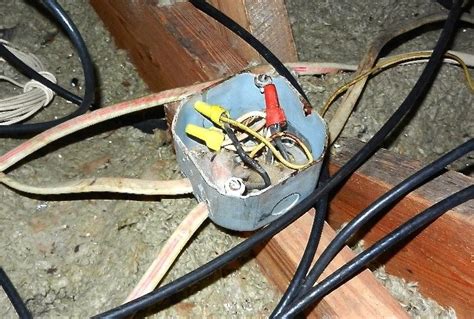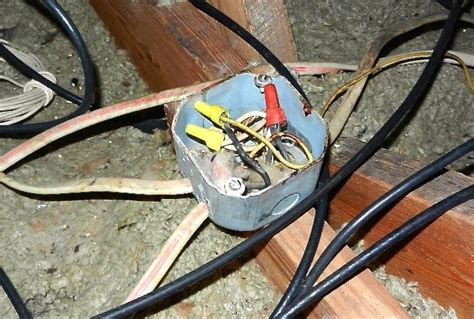what is a junction box in attic Installing an electrical junction box or J-box in the attic is not much different from installing a J-box anywhere else. The same basic National . The fundamental goal of sheet metal forming procedures is to give the metal sheets particular geometrical modifications while preserving their structural integrity. The common types of sheet metal operations are shearing, blanking, punching, piercing, trimming, drawing, embossing, bending, and squeezing operations. Learn about sheet metal here!
0 · junction box wiring requirements
1 · junction box in attic code
2 · insulated junction box
3 · electrical junction box in attic
4 · covering electrical junction box
5 · attic light with outlet
6 · attic junction box under insulation
7 · are junction boxes legal
Through the MCB phase lines are distributed to electrical wiring for lighting, fixed devices, and power distribution points. This type of arrangement is the commonly used method of distribution board for house wiring.
In most places, they put the connections in a junction box (I corrected one or places where connections (wire nuts) were just dangling in .A junction box is an electrical enclosure that houses one or more wiring connections. The box protects the connections, which usually contain vulnerable points such as wire splices, from environmental conditions and accidental . A junction box is an enclosure designed to safely contain electrical connections, preventing potential hazards such as electrical shocks or fire outbreaks. It serves as a central hub where multiple electrical wires can be .
A junction box provides a safe, code-compliant space for housing cable connections for outlets, switches, or splices. They prevent potential electrical shocks, and keep sparks from spreading to flammable surroundings.
Installing an electrical junction box or J-box in the attic is not much different from installing a J-box anywhere else. The same basic National .Depending on the specifics of your attic, you may need to make some structural changes to accommodate the junction box. Installing it on the top end of a joist is generally considered the safest option. In this guide, I’ll explain how you can . A junction box is not a special type of box but any standard electrical box used to enclose wire splices. The most commonly used box for junctions is a 4-inch square box (either metal or strong plastic), which offers .
Even the professionals don't always give much thought; the original blown-in insulation in my attic covers every last inch of wiring and junction box. Each time I go up there, I bring a broom and sweep around a large area to simply find a cable, box, or wall penetration. Every splice must happen inside a junction box. The cable sheath must come into the junction box at least 1/4" past the cable clamp. The individual wires must be 6" long past the point of entry (including sheath). Now in a case . Installing a junction box in the attic has certain requirements that must be met to ensure safety and compliance with electrical codes. Here are some fundamental considerations: Accessibility: The location of the junction .Our company tends to not leave junction boxes in the attic. But you can, and the reason for them is mainly when people remodel their homes and they move walls and switch/outlet boxes around. Some electricians will just junction the wires in the roof and run a wire from the junction box to the new location of switch/outlet.
Boxes can be made of metal or plastic, and you usually screw or nail them to a stud or rafter, although you can anchor remodeling boxes directly to the surface of drywall. The only difference between a box for a circuit device and a junction box, or J-box, is that the latter serves no other purpose than to enclose spliced wires.
junction box wiring requirements

Junction boxes on rafters are fine but make sure there's at least 1.5" clearance from the back of the junction box to the outside edge of the rafter, since roof sheathing, properly installed, will be nailed with 1.5" penetration into the rafter . The code for junction box in the attic is junction box cannot be concealed in walls, ceilings, or non-accessible attics and under the floor of your building. This is referred to in the National Electrical Code as NEC 314.29. It is also referred to in the IRC as 2003 IRC.E3806.4.
sheet metal materials
In offices, junction boxes are usually in the ceiling, above the t-bar. But they are accessible by moving the ceiling tile. Or in a drywall ceiling, an access panel has to be installed. Reply reply . same cable and throw a junction in the attic if it’s above it, run long enough cables down to new location of socket. . Installing an electrical junction box or J-box in the attic is not much different from installing a J-box anywhere else. The same basic National Electric Code or NEC rules apply. Installing a J-box in the attic is easiest if the attic is unfinished .Junction boxes in the attic are not uncommon if accessible, but what was it split off to is the question? Reply reply mackadelic • If I trace it looks like there’s another newer added outlet to bedroom which the junction box is over It’s a 20 amp breaker that powers three rooms, (2) hallway lights and a bathroom .
An experienced electrician may have to install a larger box or stack another box on top, in order to enclose all the wire connections in the junction box with a cover. Missing Junction Box in Attic Electrical connections made improperly can . Juction in attic ok Juction in attic ok Have used junction in attic many time for fire damage and vandals. Only comment ever got from inspector was keep boxes up high in good sight above extra insulation that might be added later.Can I simply stick this IC-rated slim LED light junction box in the attic with these cellulose fiber insulation around it? Or do I need to built a box around it? Share Add a Comment. Sort by: Best. Open comment sort options . Just use the right ROMEX adapter in the box when running the wire in it. Dont just punch a hole out and stick ROMEX in .
junction box in attic code
Why would I choose a large 4x4x2.5 metal box (this is what my brain tells me to use) vs plastic box. The plastic looks like they are all designed for installing switches or outlets and not covers but they are larger and cheaper. Is there a reason why one would not just use the plastic box and cover for a junction box either in an attic or basement. Electrical - AC & DC - junction box in attic - I was watching this old house today and they were talking about a house that had a safety hazard. The house had a junction box in the attic covered by insulation and then plywood. Now I might not understood what they were saying but is it against code to have an
I removed the junction box from the ceiling (4 cables in it) and according to the Canadian Electrical Code I am allowed to place it in the attic or crawl space (my case) with a head clearance of at least 35.4 in. I am thinking . Maybe it's a local code thing, but around here I've never seen the junction boxes in an attic mounted on the side(s) of a ceiling joist. The are always mounted on the top of the joist with the wiring run on the side, some type of .
I want to know where I can locate junction boxes (for housing wire nut splices from NM cable) in my attic. My house is real old and has every kind of wiring I can imagine, including knob and tube. The insulation is very deep and covers the top of the joists below. I have dug through this to find the old wires and junction boxes.
The junction box must be visible in the attic, otherwise, it could be forgotten about and potentially be dangerous. The box can be mounted to the side of a joist, or onto its top edge. Building regulations and code inspectors are likely to approve of a junction box being located in the attic, as long as it is considered safe and visible.You can absolutely junction in the attic with a nail on, and I would stress to make it accessible and easily identifiable, not in a place where it’s buried under insulation . Attic boxes get stepped on and banged around, the usual reasons to use plastic (trying to avoid fucking up drywall) don't apply. Metal is better. But plastic meets .

Does it require junction box in the attic? Mr. Home Inspector says wire will start and cause fire. So get electrician. Realtor said, handyman can do it. Its crawl space looking attic. Inspector says probably need to do entire wiring again. . And yes, those splices need to be inside a junction box with a blank cover. Reply reply Junction boxes in attic. Jump to Latest 4K views 12 replies 8 participants last post by Blockisle9 Mar 11, 2021. R. RickAut Discussion starter 5 posts
Installing a junction box in your attic is a crucial skill for homeowners looking to tackle electrical projects safely and effectively. Whether you’re adding lights, extending wiring, or simply organizing existing electrical lines, a junction box provides a .
insulated junction box

Cut the wire between two boxes and pull it into each of them. Run a new length of wire between, and splice in your new outlet leg from one box. It's more or less blacks to blacks and whites to whites. Junction boxes must remain accessible. Secure all cables appropriately (and within a foot of each box). (One feeding power in, two taking power to ceiling junction boxes in adjacent rooms and one is the switch loop for the fan.) I need to add a cable for another switch for the recessed lights so rather than cram a 5th cable in an already crowded box I was planning on installing an attic accessible junction box on the joist next to the existing box.

How to Correctly Install a Junction Box in the Attic. Installing an electrical junction box, or J-box, in the attic is similar to installing a J-box elsewhere. The fundamental National Electric Code, or NEC, guidelines are the same. The easiest way to install a J-box in the attic is if the attic is unfinished and only used for storage. NM through to soffit in non-accessible attic Junction box under soffit to transition from NM to 10AWG THWN (grounds crimped) THWN in 3/4" metal conduit down to switch or 2-circuit Solar Load Center Through the wall into the basement and into the subpanel (sized for at least 5760W if using a load center or 3840W if using switch. .
sheet metal los angeles ca
sheet metal mechanical properties
CNC, or Computer Numerical Control, machines utilize computerized programming to automate the movement of tools and machinery, enhancing precision and efficiency in manufacturing. Here’s a closer look at the primary types of CNC machines and their applications. CNC Machining Centers (Milling)
what is a junction box in attic|are junction boxes legal